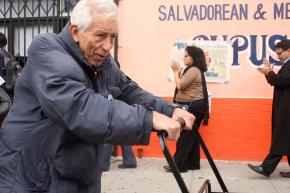Challenging an eviction threat
reports on the struggle of one group of San Francisco tenants to not be moved.
SAN FRANCISCO--Many of the residents of 2789 Harrison St. have lived there for over 20 years. Allen McCarthy, their new landlord, has owned the property for less than a year--and he wants them out.
First, he set new rules, like "no parties." Then, he started renovations on the building--which would normally be welcome, but given the gentrification of the largely working-class Latino neighborhood, this was an ominous sign.
Worse, the tenants weren't consulted. Construction workers would show up unannounced and begin work, sometimes early in the morning. Windows were taken out, but not replaced for days, leaving some apartments windowless on winter nights.
In November, residents were dealt the Season's Greetings of an enormous rent increase of between $600 and $1,100 per family. "In these difficult times, to raise rents so high on working-class people amounts to no-cause eviction," said community activist Eric Quezada.
This is exactly what has been happening nearby. Across the road, tenants in another building were forced out through rent increases--they couldn't find affordable homes in the neighborhood, and moved to Oakland or the Bayview, forcing their children to move to different schools.

The residents of 2789 didn't want this to happen to them, too. They approached activists at the San Francisco Organizing Project (SFOP), who helped them come up with a strategy to resist. The residents wrote a letter to the landlord saying they wanted to stay, but would need to negotiate the rent--and sent it with the rent checks of all the families in one envelope. The message: the tenants were united.
The organizing continued. There was a rally of 150 people earlier this year, and the landlord has been under some public pressure to negotiate. However, he recently sent notices of eviction to the families, unless they pay the rent increases.
"This is racism," said Christina Olague, a Chicano activist who spoke at a rally of 50 people outside 2789 Harrison on July 22. "We don't like to say that word, but that is what it is."
The crowd agreed, and looking around, it was hard to miss the reality of what was happening. There are new boutiques everywhere and, finally, improvements to the streets. Trees were being planted. As Quezada asked, "Who is it improving for? For new people in the neighborhood. And that isn't fair. Did anyone consult the residents of 2789 Harrison about what sort of gardens should be planted? No."
Because these gardens aren't for them. "I think McCarthy is a predator," Quezada added. "He totally disregards people here. They aren't people to him."
But he didn't plan for such dedicated resistance, and soon before the latest rally, the organizers received a call saying that McCarthy was willing to negotiate.
Lorena Melgarejo, an organizer with SFOP, explained why their strategy was working. Although the landlord is legally able to raise rents, the organizing gives him terrible PR. Even other landlords have commented on the greediness of his increases. The landlords are worried about potential legislation to expand San Francisco's rent control laws to buildings built since 1979. McCarthy would not want to be the poster child for this new legislation.
The residents of 2789 Harrison Street and their supporters at SFOP, Mission Anti-displacement Coalition, St. Peter's Church LeaderShip Organizing Committee and others will all be keeping up the pressure to ensure that they will not be moved.


